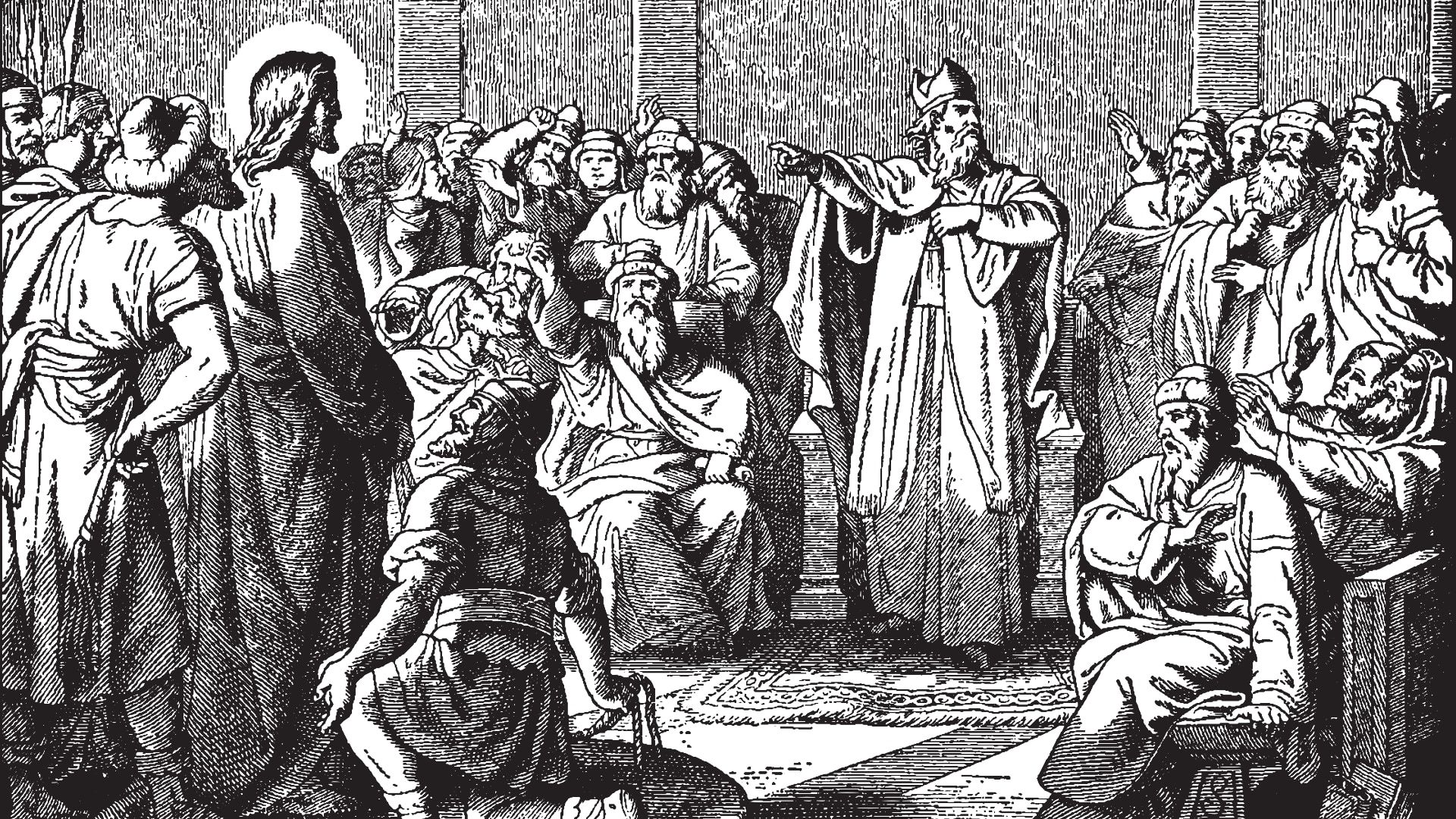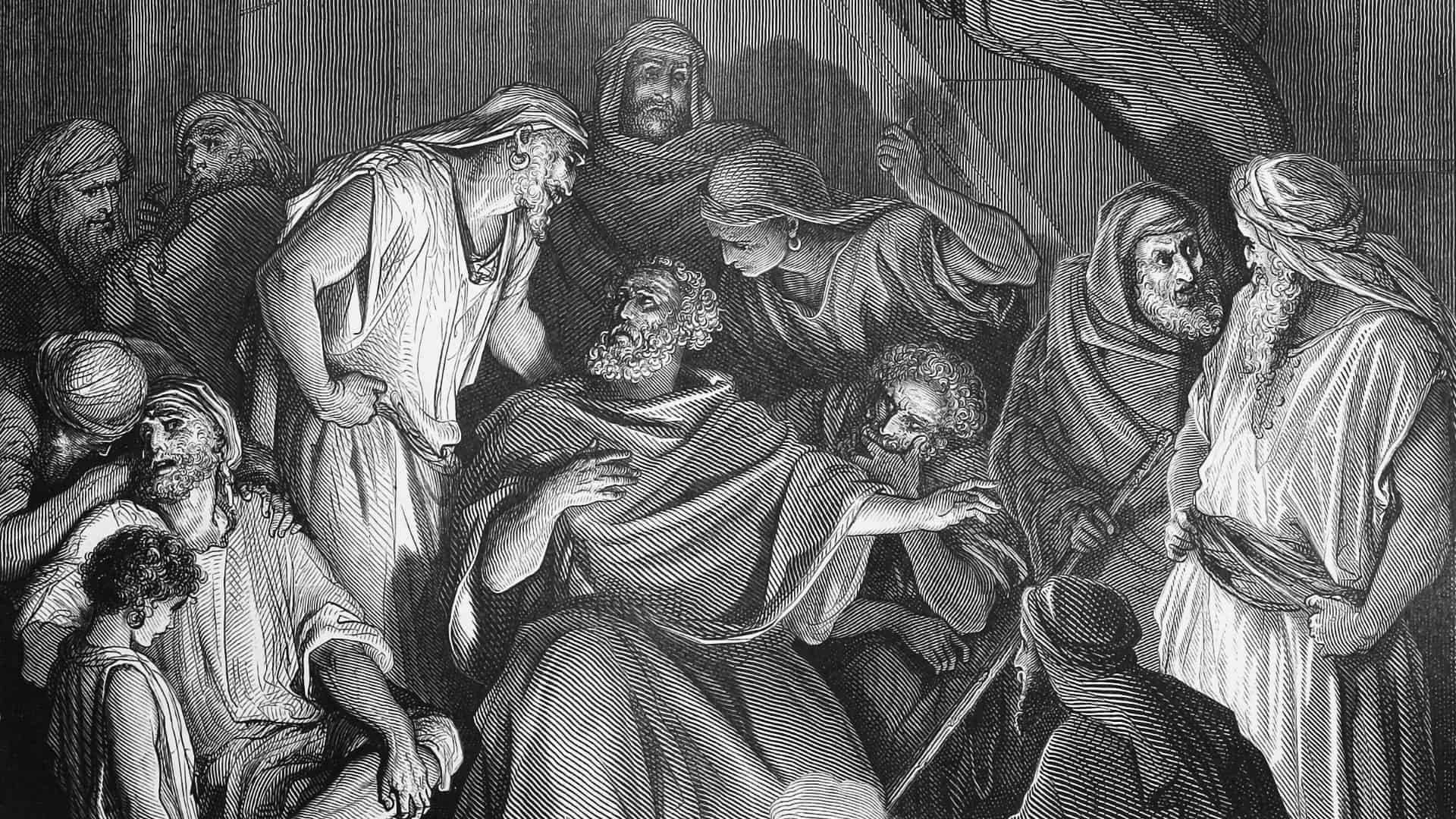The Cross-Shaped Life (Mark 9:30-50)

We're studying a passage today that will greatly benefit our church and ourselves. At first glance it looks like a hodgepodge of sayings about different topics: infighting, children, exclusion, and temptation. But it’s far more than this. The passage shows us who we really are, points out our problems, identifies the root cause of our sins, provides a solution, and describes what the outcomes could be.
So let’s look at this passage, and let’s begin by asking what this passage reveals about what’s wrong with us.
We've now arrived at the point in the Gospel of Mark where Jesus dedicates most of his efforts to training his disciples. He’s preparing them for ministry, so that they can carry on after he’s gone. But Jesus knows that there are some very significant issues in their lives. If we’re honest, we’re going to have to admit that they are problems in our lives too.
What are these problems? The first problem that this passage identifies is self-absorption. Mark 9:33-34 says:
They came to Capernaum. When he was in the house, he asked them, “What were you arguing about on the road?” But they kept quiet because on the way they had argued about who was the greatest.
This is shocking, isn’t it? We are not usually so blatant as the disciples were. We are surprised when people confess to having this problem. Ashleigh Brilliant is a cartoonist and an author, and he spoke for us all when he wrote these words: “All I ask of life is a constant and exaggerated sense of my own importance.” And if we’re honest, we would have to admit that this is our problem too.
The disciples were following Jesus. They understood that Jesus is the Messiah, the Son of God. This means that they were closely connected to the deliverer who would rescue Israel and gain status and honor and even worship. They began to think about how they could place themselves so that they could milk their relationship with Jesus so that they too could receive positions of power and glory.
A friend of mine works with a ministry to athletes. He was driving with some hockey stars one night when they were pulled over by the police. The officer came up and began as usual. “Do you know how fast you were driving, sir?” He shone the flashlight into the car and then yelled back to his fellow officer. “Hey, do you know who’s in here?” He began looking at each of the passengers in the car, each of whom was a professional and well-known hockey player. Then he shone the flashlight on my friend. “Who are you?” he asked. “Nobody.” “You’ve got to be somebody. What team did you play for?” “I didn’t play for anyone. I’m nobody.”
We all have the desire, don’t we, for the flashlight to be shone on us, and for somebody to say, “Who are you? You must be somebody!” We crave the status and approval of others, and we desperately want to be on top, even at the expense of others.
This even happens among Christians. I’ve been reading The Works of Jonathan Edwards. Edwards was one of the greatest theologians and pastors in American history. His wife records a period of intense spiritual growth and delight in God. Do you know one of the evidences she mentions of God working in her life? That if a visiting preacher came, and God really moved through that visiting preacher instead of her husband, she would be okay with that. I read that and thought, “You struggle with that? You spiritual midget!” No, I thought, “I can relate to that too.” We all struggle with being self-absorbed, and this passage puts a finger on this problem.
The second problem is very closely related. It’s judging others based on our own insecurity. Mark 9:38 says, “‘Teacher,’ said John, ‘we saw someone driving out demons in your name and we told him to stop, because he was not one of us'” – literally because he was not following us. On one hand, this looks very wise. Exorcists in that day would use the name of any deity that they thought would work in order to cast out demons. It’s possible that this man didn’t even believe in Jesus. Can you imagine the problems that could come with allowing just anyone to run around doing this? He hadn’t been with Jesus, hadn’t been trained by Jesus like the disciples.
It’s interesting that John never said, “Teacher, we saw someone casting out demons in your name, and we tried to stop him, because he was not following you.” He said, “Teacher, we saw someone casting out demons in your name, and we tried to stop him, because he was not following us.” The real issue seems to come out here. The concern has the appearance of being a noble one, but it’s hiding something far more sinister. This man was a blow to their sense of identity. It undermined their special status. They had just failed to cast out a demon shortly before this, and here was this man who wasn’t even one of them casting out demons, apparently with success. They were not happy, but it wasn’t primarily out of a concern for Jesus. It was out of their own insecurity.
Again, this still happens today. Jesus spoke of love as the distinguishing mark that characterizes his disciples. We aren’t generally known for our love. We are pretty good at expressing concerns about other groups that name Jesus because they’re different from us. We can even make it sound good and noble. But often it’s just a cover for our own insecurity.
This isn’t just about churches. It can also apply to us as individuals. It’s very easy to express concerns about other people. “Why don’t you talk to her anymore?” “Haven’t you heard. I just can’t agree with the way they do X.” The real reason, of course, is because they are a threat to our identity. We dress it up, but that’s the core issue. That’s the second issue that this passage identifies.
One more issue: not taking sin seriously. If you read verses 42 to 48, you can’t help but notice the over-the-top language. You’ve got people being drowned, body parts being cut off, people being thrown into hell. This is very intemperate language. It’s not at all the type of language that you would expect to hear from Jesus.
Of course, you’re right to be surprised by the language. Jesus uses hyperbole in this passage. He’s intentionally overstating his point. We know this because Scripture elsewhere forbids self-mutilation. Jesus is intentionally overstating his case so that we understand the severity of sin. No sin is worth going to hell for. It’s far better to deal with sin and temptation severely than to have our souls destroyed by sin. Nothing less than eternal life and death is at stake. We can’t afford to fool around with sin.
Why does Jesus say this? Because he’s putting his finger on a third problem. We tend to minimize sin and its effects. We think it’s not a big deal. We do not take the necessary steps to eradicate sin from our lives. We tend to tolerate it, wink at it, think that it’s no big deal. Jesus says it will destroy us, and that dealing with these areas is more important than even the things that are indispensable to us.
So look at what this passage is putting its finger on. These are three problems that probably characterize everybody here. We’re self-absorbed, wanting to be noticed, wanting to be somebody. We put others down and make it look good, when the real issue is actually our own insecurity. We don’t take our own sin seriously. We are far too ready to tolerate things that can destroy us and destroy others. As a result you have bickering and exclusion and patterns of sin that are nurtured. It’s not a pretty picture.
Why does this passage put its finger on these issues? It’s because they are characteristics of a pattern of behavior that reveals an underlying problem. That’s the second thing we need to see.
Let’s look at the sin that’s underneath all the sins that this passage has identified.
At first glance, we said, this looks like a hodgepodge of unrelated issues. It almost seems like somebody who’s confronting you and listing all the things about you that bug them. You feel like saying, “Enough! Just deal with one sin. I can’t handle the grocery list.”
If you look carefully at this passage, though, you realize that Jesus isn’t dealing with a grocery list of sins. Under all these sins is one underlying sin. There’s one underlying issue that shows itself in our pride, our judging of others, and our willingness to tolerate sin.
What do I mean? If you study Mark carefully, you’ll notice that Jesus repeats the same pattern here that he did back in chapter 8. He predicts his own suffering; he corrects a mistake in the disciples; and then he clarifies what it means to follow him in light of his suffering. In other words, the fundamental issue here is a failure to understand that we serve a Savior who went to the cross, and who invites us to follow him and suffer. This is a huge issue for us. Ajith Fernando writes:
I think one of the most serious theological blind spots in the western church is a defective understanding of suffering. There seems to be a lot of reflection on how to avoid suffering and on what to do when we hurt. We have a lot of teaching about escape from and therapy for suffering, but there is inadequate teaching about the theology of suffering. Christians are not taught why they should expect suffering as followers of Christ and why suffering is so important for healthy growth as a Christian.
Do you know why the disciples were struggling with all of these problems? Because they hadn’t yet grasped what Jesus was going to do. They thought Jesus was a victorious conquerer. They had no category for a Messiah who would suffer and be killed. We read:
They left that place and passed through Galilee. Jesus did not want anyone to know where they were, because he was teaching his disciples. He said to them, “The Son of Man is going to be delivered over to human hands. He will be killed, and after three days he will rise.” But they did not understand what he meant and were afraid to ask him about it. (Mark 9:30-32)
The fundamental problem is that the disciples failed to grasp the way to the cross as not only the path Jesus would take, but the path that they were called to take as well.
You see, if they had understood that Jesus was walking on ahead to a sacrificial death, they would have realized how ludicrous it is to push and shove to establish the order of the procession behind him. When you’re marching to a cross, you stop pushing to get to the front of the line. If they had understood that Jesus was laying his life down in service by going to the cross, they wouldn’t be threatened by somebody casting out demons who wasn’t part of their group, because servants don’t get threatened. They aren’t worried about their position; they are worried about serving. If they understood the lengths to which Jesus would go in order to offer his life for them, they would understand not only the seriousness of sin, and offered their lives without restraint in return.
In other words, their problem was not just a bunch of unrelated sins. Their problem was one underlying issue: they hadn’t grasped the cross. They hadn’t yet understood that Jesus would suffer and die. And they hadn’t worked out the implications of this for their lives.
It’s the same with us. Whatever issue you are facing in your life, you can trace it back to one underlying issue: you haven’t yet worked out the implications of the cross in that area of your life. As somebody has put it:
The main problem, then, in the Christian life is that we have not thought out the deep implications of the gospel, we have not “used” the gospel in and on all parts of our life. Richard Lovelace says that most people’s problems are just a failure to be oriented to the gospel – a failure to grasp and believe it through and through. (Tim Keller)
When we understand the cross, and when we understand that we have been called not only to enjoy the benefits of the cross, but to follow Christ in giving our lives away, then we will be transformed in these areas.
So let’s look as we close at what would happen if we lived this way.
Do you know where this really works itself out? It works itself out in our relationships. One of the characters in a novel said:
I love mankind…[but] the more I love mankind in general, the less I love human beings in particular…I am unable to spend two days in the same room with someone else…No sooner is that someone else close to me than his personality…hampers my freedom. In the space of a day and a night I am capable of coming to hate even the best of human beings: one because he takes too long over dinner, another because he has a cold and is perpetually blowing his nose. (The Brothers Karamazov)
Can you relate? If we are really shaped by the gospel it will affect the way we live in community.
So, according to verses 35 to 37, we’ll stop worrying about our own status, and we’ll become servants to all – even to an infant. In those days, children weren’t romanticized like they are today. They were seen as insignificant, dependent, vulnerable, and unlearned. They consumed and demanded much more than they gave. But Jesus says that when we’re shaped by the cross, we’ll stop worrying about our status, and we’ll willingly serve even the last and the least.
In verses 38 to 41, the disciples are threatened by this rogue disciple. But Jesus throws open his arms and welcomes not only rogue disciples who claim his name, but also those who do the smallest task – offering a cup of cold water. When we see ourselves as servants, and when we understand how Christ has welcomed us, then we’ll be ready to welcome others as well.
Then, as we close, there are verses 49 and 50:
Everyone will be salted with fire. “Salt is good, but if it loses its saltiness, how can you make it salty again? Have salt in yourselves, and be at peace with each other.”
What in the world does this mean? What does it mean to be salted with fire? There is one place where salt and fire came together: when offering a sacrifice. Leviticus 2:13 says, “Season all your grain offerings with salt. Do not leave the salt of the covenant of your God out of your grain offerings; add salt to all your offerings.” What Jesus says here is that following him is like making your life a burnt offering. It’s total and irrevocable. Then he uses salt differently, referring to its preserving and purifying qualities. When we maintain our saltiness, he says, we will be at peace with each other. There won’t be fighting and quarreling. We will be at peace with each other. Jesus calls us to live cross-shaped lives of humility and service.
There’s so much wrong with us. But we will never deal with the sins until we get to the underlying issue of becoming cross-shaped. And when our lives become cross-shaped, we will live lives of humility and service and become a community of people transformed by the gospel.





